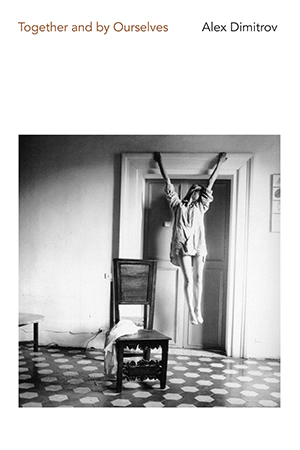Verdad Magazine Volume 23
Fall 2017, Volume 23
Together and by Ourselves By Alex Dimitrov
Review by Bill Neumire
Alex Dimitrov is, by now, as much a brand as he is a poet, recently starting, with fellow poet Dorothea Lasky, the Astrology Poets Twitter series that features horoscope tweets like, “Holiday Gift Ideas 4 Libra: Your undivided attention for 12 months, lemon-scented thank you notes, dancing lessons they will never go to.” His second book of poems, Together and by Ourselves, features separate poems that feel as one, a consistent stream of fascinating, deeply felt interior monologue. It’s not totally different than ‘Night Call,’ a project for which Dimitrov gave private readings in the bedrooms of strangers. But now we are the strangers there in his room, his private space made public.
The speaker, a poignantly epiphanic version of Dimitrov himself, is New York School conversational with quips like, “On the way out someone said, what a terrible way to portray life. / But about us” (74). It’s a skeptical voice, but one looking for wonder, one that admits, “I am shy but impressed” (50). It’s a speaker convinced that the final frontier is the fragile, brief self, as we get in this moment:
And now, before the obvious ending
I’ve somehow come up to the roof. Here
where our voices sound indistinct, almost impossible.
Who would think (I left without telling anyone)
it was ever just us.
Dimitrov’s poems move in non-sequiturs and sudden epiphanies. They are nearly always in one stanza of continuous interior monologue, careening thoughts and feelings, which here are often blurred. The lines are almost all end-stopped, staccato as in “How the night hail made imprints all over. / Our things. Our charming and singular things” (8). They travel, though, and make their way to acute insights if not permanent destinations, concluding that “the way a thing is done becomes more important than the thing itself” (40).
The travel is literal here as well, a collection that takes us from New York to Los Angeles or in mid-flight in transit, a collection about moving among people within a self and the constant osmosis that occurs. Travel both disorients and reaffirms our inner mettle, as the speaker warns, “Spatial disorientation occurs when you don’t refer to your instruments / and begin to believe the whatever inside you” (31). But it also allows one to see the unsteadiness in all of us:
Leaving town I sat next to a senseless and beautiful boy
who asked where I live.
His unwashed hair or the way his eyes were just eyes…
The soul is a tiring thing. You can have it.
I don’t know what you mean’s what I told him.
It’s more simple than that. I’m just passing through (27)
From his America, Dimitrov seeks a kind of withheld honesty, lamenting, “Everything people won’t say to each other / covers the walls of rest stops for years” (36). He recognizes everything as relative and disappointing, so what is the point? What does this traveling, disoriented/reoriented interior monologue seek and what does it discover? It’s obsessed with exploring loneliness and intimacy, with who we are in relation to each other. The book’s epigraph by Beckett is a fitting prelude: “...so long alone together. Alone together so much shared.” It’s all about how a self is constructed, how it becomes and is held up by others in an unsteady chemistry, conceding, “Finally knowing you, I know I cannot know you” (9). The self even disappears from itself in fantasy as the speaker offers, “Once I’d like to be left and unheard from” (27). And that’s the irony: loss of self, into the intimacy of experiencing other people on an honest, deep level is rare but enlarging, whispering, “People won’t tell you, but if you lose enough things you do become something. / All day the water endlessly filters so it’s not the same pool” (33). This is a speaker who wants to be pessimistic and cynical but can’t. It’s a speaker who both acknowledges the world’s real sorrows and impossible boundaries, but also, as here, remains receptive, permeable:
Hurricanes came, storms couldn’t please us:
it was all very fast and beautifully made.
You ask why I’m thinking of death
but I’m thinking of you and it’s fleeting.
We were terrible, unrelenting and everywhere then.
All I know is I can’t stop writing about people.
So much happened. I can’t stop writing about love (49).
It’s a love that requires, above all, simple attention to remember that “Every lover is a stranger, every stranger a lover all over again.” (69).
BIO: Alex Dimitrov is the author of Together and by Ourselves (Copper Canyon Press, 2017), Begging for It (Four Way Books, 2013), and the online chapbook American Boys (Floating Wolf Quarterly, 2012). He is the recipient of the Stanley Kunitz Prize from the American Poetry Review and a Pushcart Prize. His poems have been published in Poetry, The Yale Review, Kenyon Review, Slate, Tin House, Boston Review, and the American Poetry Review. He is the Senior Content Editor at the Academy of American Poets where he edits the popular online series Poem-a-Day and American Poets magazine. He has taught creative writing at Rutgers University-New Brunswick, Marymount Manhattan College, Bennington College, and lives in New York City.

Together and by Ourselves
Publisher: Copper Canyon Press (April 4, 2017)
ISBN-10: 1556595107
ISBN-13: 978-1556595103
